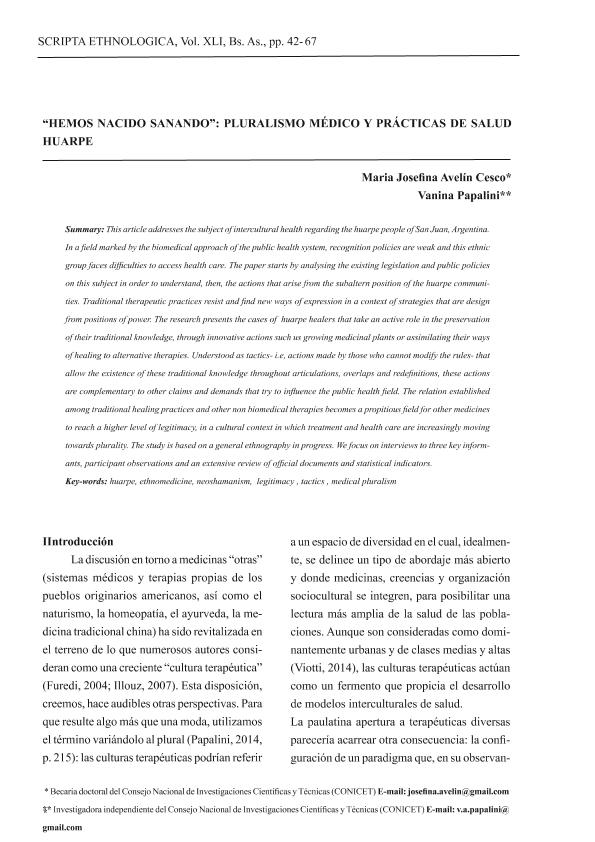Artículo
El artículo aborda la salud intercultural en relación a la etnia huarpe de San Juan, Argentina. En un terreno marcado por la salud pública en términos biomédicos, las políticas de reconocimiento son débiles y el acceso a la salud no resulta suficiente. El análisis de la legislación existente y de las políticas de salud dirigidas a la etnia huarpe es el punto de partida para comprender las acciones que surgen desde una posición subalterna. En el contexto de estrategias diseñadas desde lugares de poder, las prácticas terapéuticas tradicionales resisten y encuentran otras formas de expresión. La investigación presenta el caso de algunas sanadoras huarpe que toman una posición activa en la preservación del acervo de saberes tradicionales por vías novedosas tales como el cultivo de plantas medicinales o la asimilación a las terapias alternativas. Entendidas como tácticas –acciones de aquellos que no pueden modificar las reglas del juego- que posibilitan su existencia por la vía de articulaciones, traslapos y redefiniciones, estas acciones complementan otras demandas y reivindicaciones que intentan incidir en el terreno de las políticas sanitarias. La relación que se establece entre prácticas tradicionales de curar y otras terapias no biomédicas resulta un campo favorable para que otras medicinas alcancen una legitimidad creciente en un espacio cultural cuya tendencia hacia la pluralidad en términos de tratamiento y cuidado de la salud se afianza paulatinamente. Una investigación etnográfica general en curso sirve como marco para este análisis focalizado en entrevistas en profundidad realizadas tres informantes claves, observaciones con participación y una vasta recopilación y análisis de documentos y estadísticas de salud. This article addresses the subject of intercultural health regarding the huarpe people of San Juan, Argentina. In a field marked by the biomedical approach of the public health system, recognition policies are weak and this ethnic group faces difficulties to access health care. The paper starts by analysing the existing legislation and public policies on this subject in order to understand, then, the actions that arise from the subaltern position of the huarpe communities. Traditional therapeutic practices resist and find new ways of expression in a context of strategies that are design from positions of power. The research presents the cases of huarpe healers that take an active role in the preservation of their traditional knowledge, through innovative actions such us growing medicinal plants or assimilating their ways of healing to alternative therapies. Understood as tactics- i.e, actions made by those who cannot modify the rules- that allow the existence of these traditional knowledge throughout articulations, overlaps and redefinitions, these actions are complementary to other claims and demands that try to influence the public health field. The relation established among traditional healing practices and other non biomedical therapies becomes a propitious field for other medicines to reach a higher level of legitimacy, in a cultural context in which treatment and health care are increasingly moving towards plurality. The study is based on a general ethnography in progress. We focus on interviews to three key informants, participant observations and an extensive review of official documents and statistical indicators.
Hemos nacido sanado: Pluralismo médico y prácticas de salud huarpe
Fecha de publicación:
12/2019
Editorial:
Centro Argentino de Etnología Americana
Revista:
Scripta Ethnologica
ISSN:
0325-6669
e-ISSN:
1669-0990
Idioma:
Español
Tipo de recurso:
Artículo publicado
Clasificación temática:
Resumen
Palabras clave:
HUARPE
,
ETNOMEDICINA
,
NEOCHAMANISMO
,
LEGITIMIDAD
,
TÁCTICAS
,
PLURALISMO MÉDICO
Archivos asociados
Licencia
Identificadores
Colecciones
Articulos(CIECS)
Articulos de CENTRO DE INVESTIGACIONES Y ESTUDIO SOBRE CULTURA Y SOCIEDAD
Articulos de CENTRO DE INVESTIGACIONES Y ESTUDIO SOBRE CULTURA Y SOCIEDAD
Citación
Avelin Cesco, Maria Josefina; Papalini, Vanina Andrea; Hemos nacido sanado: Pluralismo médico y prácticas de salud huarpe; Centro Argentino de Etnología Americana; Scripta Ethnologica; 41; 1; 12-2019; 42-66
Compartir




